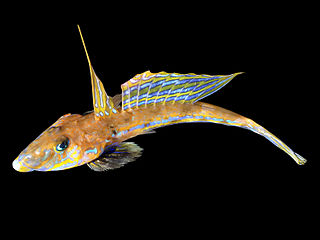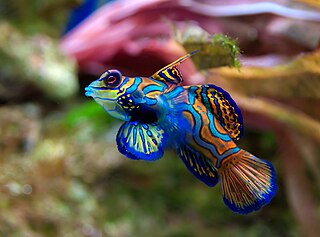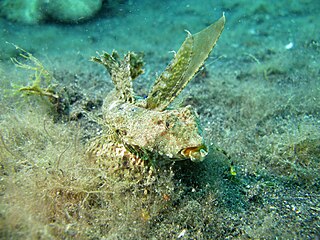
Foetorepus is a genus of dragonets. The validity of this genus has been questioned with some experts regarding it as a junior synonym of Synchiropus.

Helcogramma striatum, commonly called the tropical striped triplefin, the striped threefin or the neon triplefin, is a triplefin blenny of the genus Helcogramma, native from the central Indo-Pacific.

Enneapterygius is a genus of fish in the family Tripterygiidae found in the Indian and Pacific Ocean.

Callionymus is a genus of dragonets found mostly in the Indian and Pacific oceans with a few species occurring in the Atlantic Ocean.
Callionymus colini, the Tiny New Guinea longtail dragonet, is a species of dragonet endemic to the Pacific Ocean waters around Papua New Guinea. The specific name honours Dr Patrick L. Colin, of the University of Papua New Guinea's Motupore Island Research Station in Port Moresby, who collected the type specimen.
Callionymus hildae, Hilde’s darter dragonet, is a species of dragonet endemic to the Pacific waters around the Philippines. The specific name honours Miss Hildegard Handermann, of Braunschweig, for her "continued interest" in the author's, Ronald Fricke's, studies.

The common dragonet is a species of dragonet which is widely distributed in the eastern North Atlantic where it is common near Europe from Norway and Iceland southwards. It is a demersal species that occurs over sand bottoms. It lives to a maximum age of around seven years. It is caught in bycatch by fisheries and is used in the aquarium trade.
Callionymus macclesfieldensis, the Macclesfield dragonet, is a species of dragonet found only on the Macclesfield Bank in the South China Sea where it is found at depths of from 77 to 82 metres. This species grows to a length of 5 centimetres (2.0 in) SL.

Arrow dragonet, also known as the arrow-headed darter dragonet, is a species of dragonet widespread in the Indo-West Pacific from Arabian Peninsula to the Philippines. Occurs in the Mekong delta of Viet Nam and probably also in Cambodia. This species grows to a length of 11 centimetres (4.3 in) TL. The arrow dragonet is a demersal species, which occurs on sandy substrates along coastlines, in estuaries, and in the lower courses of rivers where it feeds on worms, zooplankton and phytoplankton.
Callionymus whiteheadi, Whitehead’s deepwater dragonet, is a species of dragonet found in the Pacific waters around Indonesia. The specific name honours the ichthyologist Peter James Palmer Whitehead (1930-1992).

Synchiropus is a genus of fish in the family Callionymidae found mainly in the tropical waters of the Indo-Pacific region.
Draculo is a genus of dragonets found mainly in the tropical waters of the western Indo-Pacific.
Calliurichthys is a subgenus of Callionymus, a genus dragonets, native to the western Pacific Ocean. Some authorities consider it to be a valid genus.

Dactylopus is a genus of dragonets native to the western Pacific Ocean.

Diplogrammus is a genus of dragonets.

Minysynchiropus kiyoae, Kiyo’s dragonet, is a species of dragonet native to the Pacific Ocean where it occurs around Japan and has been seen around Hawaii. This species can be found on coarse substrates at depths of from 5 to 14 metres. This species grows to a length of 2 centimetres (0.79 in) SL. This species is the only known member of its genus. The specific name honours Mrs.Kiyoe Tanaka, the widow of Tatsuo Tanaka, who donated land, facilities, and her personal time for to help establish the Tatsuo Tanaka Memorial Biological Station on Miyake-jima, Japan.
Centrodraco is a genus of slope dragonets found in deep waters of the Atlantic, Indian & Pacific Oceans.

Speleogobius is a genus of goby native to the Mediterranean Sea.
Callionymus alisae is a species of dragonet which was described in 2016 from a male specimen collected by a grab dredge as a depth of 90-228 m, southwest of Kavieng, New Ireland, Papua New Guinea. The specimen is yellowish in colour, becoming darker towards the tail and white on the underside, it has dark blue eyes and greyish spots on its body. It was name after the French research vessel which collected the only specimen known so far, the R.V. Alis.

Callionymus izuensis, the Izu dragonet, is a species of dragonet which is endemic to the waters around the Izu Islands of Japan. It is found at depths of 16–18 metres (52–59 ft) over substrates consisting of coarse sand, although sometimes coral rubble and broken shells may form part of the habitat. It was originally described as a subspecies of Callionymus persicus from the western Indian Ocean and has also been placed in the genus Calliurichthys by some authorities.












